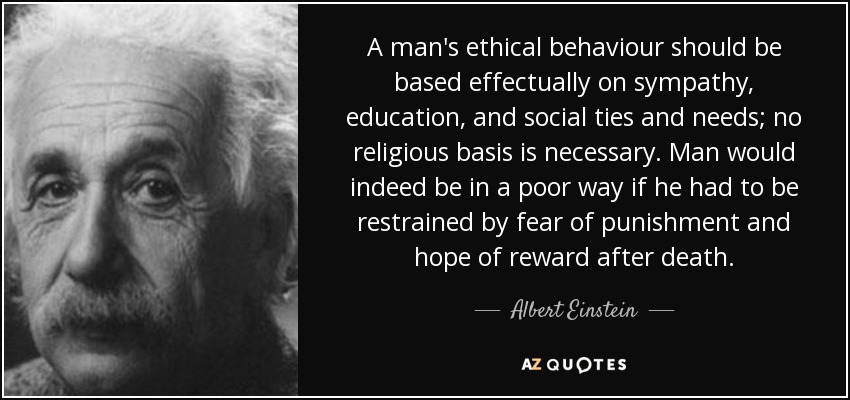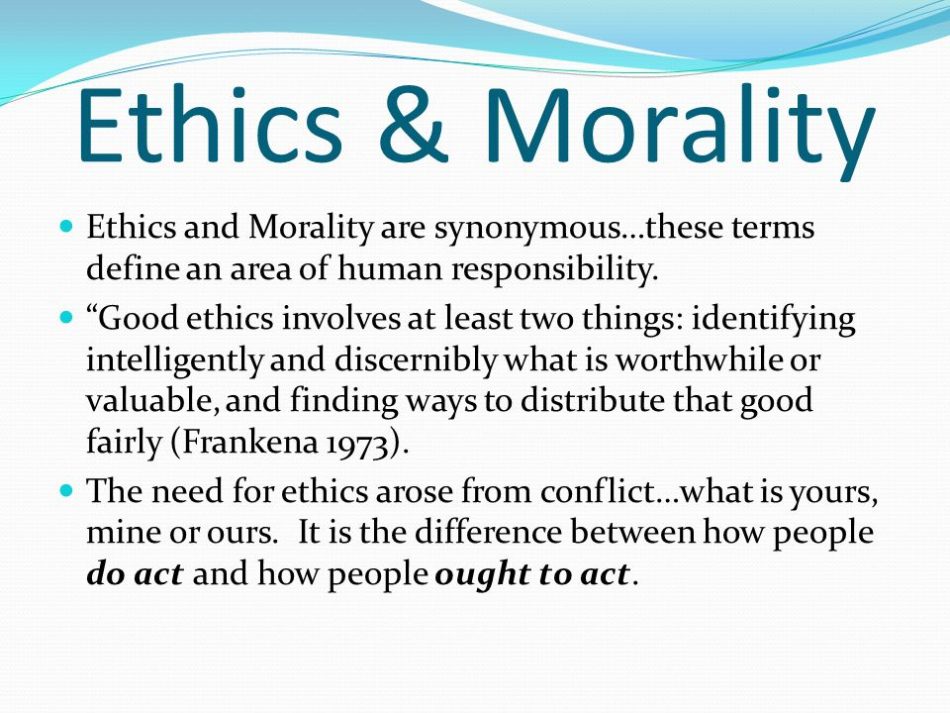
What is Ethical Behavior?
An ethical behavior is the application of moral principles in a given situation.
It means to behave according to the moral standards set by the society which we live in.
Het ethisch gedrag van een mens moet doeltreffend gebaseerd zijn op sympathie, opvoeding en sociale banden en behoeften; een religieuze basis is niet nodig.
De mens zou er inderdaad slecht aan toe zijn indien hij zich zou moeten laten weerhouden door vrees voor straf en hoop op beloning na de dood.
- Good ethics involves at least two things: identifying intelligently and discernibly what is worthwhile or valuable, and finding ways to distribute that good fairly (Frankena 1973).
- The need for ethics arose from conflict…what is yours, mine or ours. It is the difference between how people do act and how people ought to act.
- Een goede ethiek behelst ten minste twee dingen: op intelligente en waarneembare wijze vaststellen wat de moeite waard of waardevol is, en manieren vinden om dat goed eerlijk te verdelen (Frankena 1973).
- De behoefte aan ethiek is ontstaan door conflicten…wat is van jou, van mij of van ons. Het is het verschil tussen hoe mensen handelen en hoe mensen zouden moeten handelen.

Ethical behavior refers to conduct that is in alignment with principles and values that are considered morally right or acceptable. The key points of ethical behavior include:
Integrity: Ethical behavior involves honesty, truthfulness, and consistency in one’s actions and words. It means being sincere, reliable, and trustworthy in all interactions.
Respect: Ethical behavior requires treating others with dignity, fairness, and consideration. It involves valuing diversity, embracing inclusivity, and avoiding discrimination or prejudice.
Responsibility: Ethical behavior entails being accountable for one’s actions and their consequences. It means fulfilling one’s duties and obligations, and taking ownership of one’s decisions and their impact on others and the environment.
Transparency: Ethical behavior involves being open, candid, and transparent in communication and actions. It means being honest about intentions, disclosing relevant information, and avoiding hidden agendas or conflicts of interest.
Justice: Ethical behavior requires being fair, impartial, and just in decision-making and actions. It involves treating all individuals equitably, without favoritism or bias, and upholding fairness in distributing resources and opportunities.
Caring: Ethical behavior involves showing empathy, compassion, and concern for the well-being of others. It means considering the needs and interests of others and taking steps to help or support them when possible.
Compliance: Ethical behavior entails adhering to laws, regulations, policies, and professional codes of conduct. It means acting in accordance with legal and ethical standards, and avoiding unethical or illegal behavior.
Reflection: Ethical behavior requires engaging in self-reflection, self-awareness, and critical thinking. It involves examining one’s beliefs, values, and biases, and reflecting on the ethical implications of one’s actions.
Ethical leadership: Ethical behavior includes leading by example, inspiring and guiding others to act ethically. It means demonstrating integrity, fairness, and ethical decision-making in leadership roles, and promoting an ethical culture in organizations.
Continuous improvement: Ethical behavior involves a commitment to continuous learning and improvement. It means being open to feedback, willing to reflect and revise one’s actions, and continuously striving to improve one’s ethical conduct.
These are some of the key points of ethical behavior, which collectively promote a culture of integrity, accountability, respect, and fairness in personal, professional, and organizational settings.
1 Mysteries of the Church: The Church and WWII
4 feb. 2013
2 “The Holocaust-Era Archives of Pope Pius XII: The State of the Question,” Oct. 17, 2021
25 okt. 2021
For years, questions have eddied about the role of Pope Pius XII and the Catholic Church during the Holocaust. The recent opening of the Vatican archives from this era allows us to begin to know answers. After an introduction to these archives by Vatican archivist Piero Doria, this webinar features a discussion among leading scholars working with these archives about their work, their initial findings, and the significance of archival scholarship for Jewish-Christian relations.
PANELISTS:
Suzanne Brown-Fleming, Director of International Academic Programs at the United States Holocaust Memorial Museum
David Kertzer, Paul Dupee University Professor of Social Science at Brown University
Robert Ventresca, Professor of History at King’s University College at Western University
Moderator: Iael Nidam-Orvieto, Director of the International Institute for Holocaust Research at Yad Vashem
Co-sponsored by the Center for Christian-Jewish Learning at Boston College; the Programs on Ethics, Religion, and the Holocaust of the United States Holocaust Memorial Museum; and the International Institute for Holocaust Research at Yad Vashem.
3 The Scandalous Truth Behind Pope Francis’ Inauguration | The Great Conclave | Parable
Back to menu Blog
6 mei 2022


 ?????
????? APOCALYPSE CHAPTER 17
APOCALYPSE CHAPTER 17
 “(vow) oath of secrecy?” “(curse) vow of secrecy?” “(land) curse of secrecy?” “(sin) land of secrecy?” sin of secrecy
“(vow) oath of secrecy?” “(curse) vow of secrecy?” “(land) curse of secrecy?” “(sin) land of secrecy?” sin of secrecy Revelation 20: 10
Revelation 20: 10 The (deeds) oath of (evil) jesuit (Hebrews 4: 12 – 13
The (deeds) oath of (evil) jesuit (Hebrews 4: 12 – 13 ) vows (Ephesians 5: 12
) vows (Ephesians 5: 12 ) in cursed (vessels) secrecy, (corrupts) plagues any (influence) land (Deuteronomy 28: 15 – 68) that (serve) accept (babylonian) roman (behavioural) political (science) organisation (Revelation 17: 18
) in cursed (vessels) secrecy, (corrupts) plagues any (influence) land (Deuteronomy 28: 15 – 68) that (serve) accept (babylonian) roman (behavioural) political (science) organisation (Revelation 17: 18 ) in (demonic) pagan (entities) sin (Galatians 5: 19 – 21
) in (demonic) pagan (entities) sin (Galatians 5: 19 – 21 ). P A R A B L E
). P A R A B L E  Matthew 13: 13 – 15
Matthew 13: 13 – 154 Reckoning with History: Pope Pius XII and the Holocaust
12 okt. 2021
Het Vaticaan en het Derde Rijk: een onheilige alliantie
8 jun 2023
Midden in de Tweede Wereldoorlog keken katholieken naar de paus om hen te leiden. Hitler was al in het geheim begonnen met het lanceren van zijn plan om de Joden in Europa uit te roeien. In het geheim, dat wil zeggen, voor de meesten, behalve voor paus Pius XII. De paus zweeg terwijl de rest van de wereld wachtte op een groots gebaar of toespraak waarin Hitlers wreedheden werden veroordeeld.
Hij koos ervoor om te zwijgen over de misdaden van de nazi’s in heel Europa, misdaden die zelfs onder de eigen ramen van de paus plaatsvonden, zoals de liquidatie van het joodse getto in Rome in 1943, waarop de paus geen officiële reactie gaf.
Op het eerste gezicht staan nazisme en katholicisme lijnrecht tegenover elkaar. Het Vaticaan lijkt zelfs een instelling die alle verdenking te boven gaat. De kerk zal echter, op haar beurt geconfronteerd met de opkomst van het nazisme, de Tweede Wereldoorlog en de uitroeiing van de joden, een dubbelzinnige – soms onheilige – rol spelen. Verschillende mannen van de kerk, priesters en bisschoppen, die fervente bewonderaars van Hitler waren, vielen zelfs in medeplichtigheid…
Regie: JULIETTE DESBOIS
5 Prince Andrew’s Most Controversial Scandal (His Spending & Epstein) – British Documentary
25 mrt 2022
Prince Andrew’s Most Controversial Scandal (His Spending & Epstein) – British Documentary
The Duke of York speaks to Emily Maitlis about his friendship with Jeffrey Epstein and the allegations against him.
In a world exclusive interview, Newsnight’s Emily Maitlis speaks to Prince Andrew, the Duke of York at Buckingham Palace.
For the first time, the Duke addresses in his own words the details of his relationship with convicted sex offender Jeffrey Epstein, who took his own life while awaiting trial on sex-trafficking charges.
In 2015, Prince Andrew was named in court papers as part of a US civil case against Epstein
1 dec. 2020
11 sep. 2021
Prince Andrew has been served with the legal papers for a lawsuit in which he is accused of sexual abuse, according to a court document.
Lawyers representing Virginia Giuffre – who is suing the Duke of York – say in the document that the civil lawsuit was handed to a Metropolitan Police officer on duty at the main gates of The Royal Lodge, Windsor Great Park, on 27 August.
The prince has always categorically denied any sexual contact or relationship with Ms Giuffre.

At minute 13 of th video above
7 Seeing red (2013) – A fiery interview with Sarah Ferguson the Duchess of York | 60 Minutes Australia
3 mei 2018
8 Determining Moral Behavior
21 dec. 2018
Our principles of right and wrong form a framework for the way we live our lives. But where do these principles come from? Ethical systems provide the answer to the question of why something is wrong or right.
An ethical system is a structured set of principles that defines what is moral. Ethics of virtue is the ethical system that bases ethics largely upon character and possession of virtues.
One difficulty with the ethics of virtue is in judging the primacy of moral virtues. The natural law ethical system holds that there is a universal set of rights and wrongs that is like many religious beliefs, but without reference to a specific supernatural figure.
Honesty and fair dealings are always prioritized over other values. A deontological ethical system is one that is concerned solely with the inherent nature of the act being judged.
The core elements of any deontological or duty-based ethical system are the importance placed on intention, and the use of a predetermined set of principles to judge morality rather than an evaluation of the consequences of an act. A teleological ethical system judges the consequences of an act.
The difference between ethical formalism and rule utilitarianism is that the actions themselves are judged right or wrong depending on the motives behind them under ethical formalism, whereas utilitarianism looks to the long-term consequences of the prescribed rules to determine their morality. Ethics of care is the ethical system that defines good as meeting the needs of others and preserving and enriching relationships.
Peacemaking justice is an ancient approach to justice that includes the concepts of compassion and care, connectedness, and mindfulness. To summarize, the ethics-of-care approach identifies the needs of all individuals in any ethical situation and attempts to maximize them. It is different from utilitarianism, however, in that one person cannot be sacrificed for others. Also, there is an attempt to resolve situations through human relationships and a sense that decisions should come from compassion rather than attention to rights or duties.
Egoism is the ethical system that defines the pursuit of self-interest as a moral good. But if it is true that humans are naturally selfish and self-serving, one can also point to examples that indicate that humans are also altruistic and self-sacrificing. One thing seems clear: when individuals are caught doing illegal acts, or acts that violate their professional codes of ethics, or acts that harm others, it is usually only egoism that can justify their behavior.
The imperative principle directs a decision maker to act according to a specific, unbending rule. The utilitarian principle determines the ethics of conduct by the good or bad consequences of the action.
The generalization principle is based on this question: “What would happen if all similar persons acted this way under similar circumstances?” Understanding how ethical decisions are made is critical to law enforcement professionals.
Ethical relativism describes the position that what is good or bad changes depending on the individual or group, and that there are no moral absolutes. Absolutism, as previously discussed, is the position that, if something is wrong, it is always wrong.
Universalism is a similar concept in that it is the position that what is considered wrong is wrong for all people for all time and if one wants to perform a certain act, one would have to agree that anyone else should be able to do it as well. Situational ethics is the philosophical position that although there are a few universal truths, different situations call for different responses; therefore, some action can be right or wrong depending on situational factors.
Moral pluralism is the concept that there are fundamental truths that may dictate different definitions of what is moral in different situations. Interestingly, situational ethics seems to be entirely consistent with the ethics of care, especially when one contrasts this ethical system with a rule-based, absolutist system. In the ethics of care, you will recall, each individual is considered in the equation of what would be the “good.”
9 Ethical Misconduct in the Courts
21 dec. 2018
The major complaint about defense attorneys is that they do not communicate regularly with clients. Complaints received by bar associations generally involve clients who believe that they are not getting what they paid for, in that attorneys don’t return their calls, don’t keep them informed about what is being done on their case, and don’t seem to be putting any effort in the case after they have been paid.
Cases identified by the Innocence Project or by the Exoneration Registry include many examples of criminal defense attorneys not bringing forward evidence or other exculpatory evidence. Cases also include those where defense attorneys did not challenge the testimony of jailhouse informants, or, in other ways, provided such a poor defense that convictions occurred, even with little or no evidence against innocent defendants.
When prosecutors forget that their mission is to protect due process, not merely win the case, misconduct can occur.
The types of misconduct range from minor lapses of ethical rules to commission of criminal acts. Prosecutors may bolster a witness’s credentials or allow him or her to make gratuitous and unsupported claims on the witness stand, such as to state “unequivocally” that the fingerprint, hair, or lip print was the defendant’s.
Judicial canons require judges to avoid even the appearance of bias or impropriety. Misconduct is alleged when judges do not recuse themselves and/or act in ways that give preferential treatment to individuals or groups.
Most judges are ethical and take great care to live up to the obligations of their role. However, as with the other criminal justice professionals, sometimes there are systemic biases and subtle ways in which the principles of justice and due process are subverted.
The factors that seem to be correlated with wrongful convictions clearly indicate that legal professionals must take responsibility for reducing the possibility of such gross miscarriages of justice. Individuals may be affected by confirmatory bias in that they truly cannot see the exculpatory nature of the evidence because they believe so strongly that the defendant is guilty.
The reality is that the law is administered by humans with human failings and that errors and misconduct result in innocent people being convicted, incarcerated, and sometimes executed. State judicial commissions rarely sanction judges, and voters tend to be oblivious to the reputation of judges, often voting along strict party lines, thus “bad” judges keep getting reelected.
A range of potential responses to prosecutorial misconduct have been offered or implemented. Many of these have weaknesses that prevent their effectiveness. Individuals on the side of defending the wrongfully convicted may be subject to confirmation bias as well and have their own ethical blinders on regarding what is legal and ethical when they believe that they are advocating for an innocent person in prison.
Far from being static, the implementation of law reflects political realities, in direct contrast to the ideal of judicial independence that is the cornerstone of our system of government. Critics of judicial activism point out that just because judicial activists have been promoters of civil liberties and socially progressive causes, such as integration and free speech, there is no absolute necessity that activism would always champion such individual rights.
The selling of the goods provided income and ostensibly coincided with moral behaviour.
From the Cambridge English Corpus
Impairment of social and moral behaviour related to early damage in human prefrontal cortex.
From the Cambridge English Corpus
Thus, teaching respect and moral behaviour through pension sharing becomes an undertaking with almost political overtones.
From the Cambridge English Corpus
In this discussion, he assumes that the main motive to moral behaviour is our desire for the approval of others.
From the Cambridge English Corpus
The close link between these and moral behaviour is clear.
From the Hansard archive
Vernacular literature was to limit itself to moral behaviour and to the teaching of proper religious practices, especially the sacraments, and first and foremost confession.
From the Cambridge English Corpus
Moral behaviour will often mean promoting some kind of order, but actors may still have to make choices between different sorts of order.
From the Cambridge English Corpus
Such a fix would greatly reduce the significance of moral behaviour in this life, contrary to a key presupposition of the system.
From the Cambridge English Corpus
But he worries about the implications of this for the stability of moral behaviour in a fameoriented society and invokes some considerations designed to allay that concern.
From the Cambridge English Corpus
Although moral behaviour is not a matter of fame, it may still attract esteem and it may still be supported by people’s desire to be esteemed.
From the Cambridge English Corpus
True religious belief, deeply wedded to moral behaviour, makes the subject fun.
From the Hansard archive
It affects their moral outlook, their moral behaviour and their conduct in general.
From the Hansard archive
I know that there have been frequent complaints about the degeneration of moral behaviour.
From the Hansard archive
It is not right to accept different standards of moral behaviour because of environmental circumstances.
From the Hansard archive
It does not consider moral behaviour, effects or anything like that.
From the Hansard archive
Some even tell us how we should think, and some dictate our moral behaviour.
From the Hansard archive
You simply cannot take moral behaviour for granted and it needs redefining, re-exploring and nurturing again and again.
From the Hansard archive
There is a philosophical distinction between the moral behaviour of individuals and the behaviour of social groups.
From the Hansard archive
Policies are designed to influence moral behaviour where it is in the national interest that they should do so.
From the Hansard archive
Currently, for instance, demands are being made for strict moral behaviour on the part of public figures.
From the Hansard archive
Notably, early, often religious-based, notions of honour and honourable behaviour were reproduced under liberal, anti-clerical governments in the nineteenth century as codes for moral behaviour and honourable reputation.
From the Cambridge English Corpus
Thus, moral behaviour is sustained by the value of reputation, which in turn depends on there being a network of associations, so that contraventions of morality become generally known.
From the Cambridge English Corpus
These are the very real problems we are setting before youth when we relax our laws governing social obligations and standards of moral behaviour.
From the Hansard archive
10 Just For Laughs: Gags – Unbreakable Cell Phone Case
Bruce Nelson
1 jaar geleden